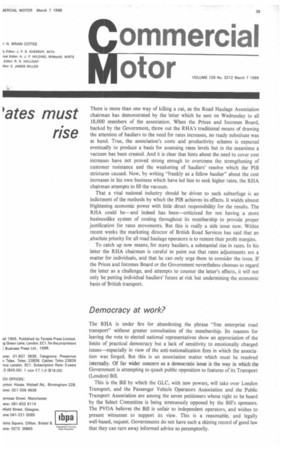r:H. BRIAN COTTEE ommercial
Page 41

If you've noticed an error in this article please click here to report it so we can fix it.
otor
There is more than one way of killing a cat, as the Road Haulage Association chairman has demonstrated by the letter which he sent on Wednesday to all 18,000 members of the association. When the Prices and Incomes Board, backed by the Government, threw out the RHA's traditional means of drawing the attention of hauliers to the need for rates increases, no ready substitute was at hand. True, the association's costs and productivity scheme is expected eventually to produce a basis for assessing rates levels but in the meantime a vacuum has been created. And it is clear that hints about the need to cover cost increases have not proved strong enough to overcome the strengthening of customer resistance and the weakening of hauliers' resolve which the PIB strictures caused. Now, by writing "frankly as a fellow haulier" about the cost increases in his own business which have led him to seek higher rates, the RHA chairman attempts to fill the vacuum.
That a vital national industry should be driven to such subterfuge is an indictment of the methods by which the PIB achieves its effects. It wields almost frightening economic power with little direct responsibility for the results. The RHA could be—and indeed has been--criticized for not having a more businesslike system of costing throughout its membership to provide proper justification for rates movements. But this is really a side issue now. Within recent weeks the marketing director of British Road Services has said that an .absolute priority for all road haulage operators is to restore their profit margins.
To catch up now means, for many hauliers, a substantial rise in rates. In his letter the RHA chairman is careful to point out that rates adjustments are a matter for individuals, and that he can only urge them to consider the issue. If the Prices and Incomes Board or the Government nevertheless chooses to regard the letter as a challenge, and attempts to counter the letter's effects, it will not only be putting individual hauliers' future at risk but undermining the economic basis of British transport.
Democracy at work?
The RHA is under fire for abandoning the phrase "free enterprise road transport" without greater consultation of the membership. Its reasons for leaving the vote to elected national representatives show an appreciation of the limits of practical democracy but a lack of sensitivity to emotionally charged issues—especially in view of the anti-nationalization fires in which the association was forged. But this is an association matter which must be resolved internally. Of far wider concern as a democratic issue is the way in which the Government is attempting to quash public opposition to features of its Transport (London) Bill.
This is the Bill by which the GLC, with new powers, will take over London Transport, and the Passenger Vehicle Operators Association and the Public Transport Association are among the seven petitioners whose right to be heard by the Select Committee is being strenuously opposed by the Bill's sponsors. The PVOA believes the Bill is unfair to independent operators, and wishes to present witnesses to support its view. This is a reasonable, and legally well-based, request. Governments do not have such a shining record of good law that they can turn away informed advice so peremptorily.












































































































































































